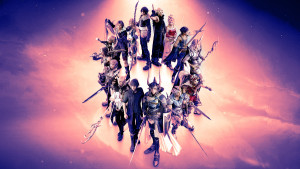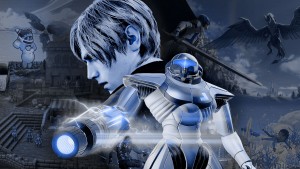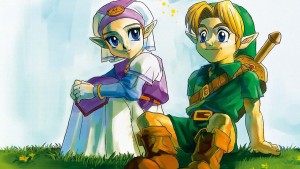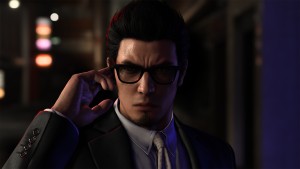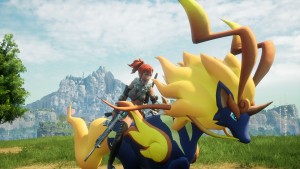
Shakedown: Hawaii Review
Your empire is crumbling. These darn kids aren’t renting videotapes anymore. Brick and mortar? More like brick and mortared, now that online shopping with free shipping has reduced a thriving retail presence to rubble. And who wants to wait around for a taxi like a chump, when an app will summon a driver at a moment’s notice? Things aren’t looking great for Shakedown: Hawaii’s aging CEO, but he’s not ready to throw in the beach towel. Over the course of his hilarious journey, you reclaim his position on the big island and thrive while sticking it to his rivals in the process.
Shakedown: Hawaii takes the essence of classic top-down GTA and arcade shooters and infuses it with a wry comic sensibility that hits its mark with the same degree of accuracy as its arcade-precise weapons. You primarily step into the flip-flops of the CEO, but you also take to Hawaii’s streets as his idiotic son (and wannabe DJ) Scooter and business associate Al. Their goal is simple: Build up an open-world business empire as quickly as possible while also catering to the outlandish whims of these darn kids and their newfangled ways.
Getting back on your feet isn’t easy at first. You’re free to explore the pixelated world, but your company is feeling the squeeze from unhappy shareholders and a business rival. Early missions quickly highlight the arsenal of weapons, which are just another tool for this cutthroat businessman. There are run-of-the-mill pistols and machine guns, as well as less orthodox tools of destruction, such as scissors, hair driers, and Contra-like spread guns. The island is teeming with life and detail, and even if you miss a shot, it’s likely to result in a satisfying amount of destruction. Indulging in open-world chaos is reliably fun, but sooner or later you’re going to need to get to business, in more ways than one.
The titular shakedowns are a low-hanging source of income when you’re first getting back on your feet, and they’re also home to some of the silliest moments. Before you can get your cut of profits from businesses, you need to intimidate the workers to show them how serious you are about forming a new “partnership.” Sometimes that means punching a mannequin until the owner agrees to your terms. Or you might have to flush some paper towels down the office commode until the pipes burst. That barber has a nice head of hair – it sure would be a shame if someone cut it all off. I quickly settled into a rhythm of scouring every block for these opportunities and was pleasantly surprised at how many different ways there were to show these civilians who’s boss. You have dozens of these shakedowns to discover, and even though scenarios repeat, they’re quick and fun enough to prevent them from feeling like a chore.
You can spend your cash on cosmetics, weapons, and a handful of character upgrades, but that’s short-term thinking. The real money is in real estate, which is also where the game shines during its first few hours. You can purchase a variety of different properties on the island, from homes and businesses to larger things like malls and an airport. Most of those acquisitions generate cash, too, which in turn allows you to buy even more. Eventually you can purchase upgrades for each property, which further multiply the amount of revenue your corporation earns from each location. The interface isn’t quite up to the task, however. I loved watching the numbers climb, but multipliers have to be purchased individually – a significant detail, considering there are more than 400 different locations you can potentially invest in. It’s tedious, and it starts to feel like, well, work.
Most of these multipliers are tied to story missions, in which your aging CEO encounters a contemporary frustration like in-store credit cards or multilevel marketing. Told through animated vignettes, these moments tackle modern life with a scathing wit, whether they’re setting their sights on artisanal foods, medical quackery, or – in one particularly great sequence – the video game industry. Even though the CEO does some cartoonishly awful things in the game, his “get off my lawn” attitude is endearing and made me look forward to every beat of the lengthy story.
Unfortunately, the game’s stingy economy quickly gives way to an overabundance of cash. It feels like a weird complaint, but in the last third of the game my company’s value had ballooned to the point where money didn’t have any meaning. Once you’re satisfied with the way your CEO’s sprite looks and have maxed out each of the easily affordable character upgrades, you have nothing else to look forward to in the economic layer. When my scheming opened up new buying opportunities in the campaign, I was able to buy buildings immediately and max out each upgrade chain without even bothering to look at the price tags. It fits into the riches-to-more-riches story, but the lack of aspirational purchases flattens out an otherwise fun system by the end.
Burying your nose in your portfolio isn’t all you can do. The island has loads of challenges to partake in, where you’re free to indulge in some of the game’s crazier elements. Each weapon in your respectable arsenal has an accompanying activity to try out. Getting gold rankings in these are an easy way to blow off some steam, and leaderboards let you show everyone how good you are at rocket jumping or tossing Molotov cocktails. It’s violent but not gratuitous; enemies die in a bloodless flash, accompanied with a hilarious lo-fi scream – even when you run them over with a steam roller.
Shakedown: Hawaii does a great job overall of recognizing what it does well and regularly delivering those moments. Taking out a plantation of goons or clearing out gang strongholds can be challenging, but it never feels punishing. True to its arcade-style inspirations, enemies drop new weapons at a steady clip, and I never felt outgunned no matter how crazy the action swelled.
The economy might be a little wonky, but Shakedown: Hawaii delivers a nice blast of classic arcade action and some solid laughs. A wealth of entertaining missions and a generous overall structure show that while the game’s CEO might be out of touch, developer VBlank most definitely isn’t.
















